Unit 5 What an adventure!Using language课件(共42张PPT)-高中英语外研版(2019)必修第三册
文档属性
| 名称 | Unit 5 What an adventure!Using language课件(共42张PPT)-高中英语外研版(2019)必修第三册 |  | |
| 格式 | pptx | ||
| 文件大小 | 28.1MB | ||
| 资源类型 | 教案 | ||
| 版本资源 | 外研版(2019) | ||
| 科目 | 英语 | ||
| 更新时间 | 2025-04-03 22:13:18 | ||
图片预览

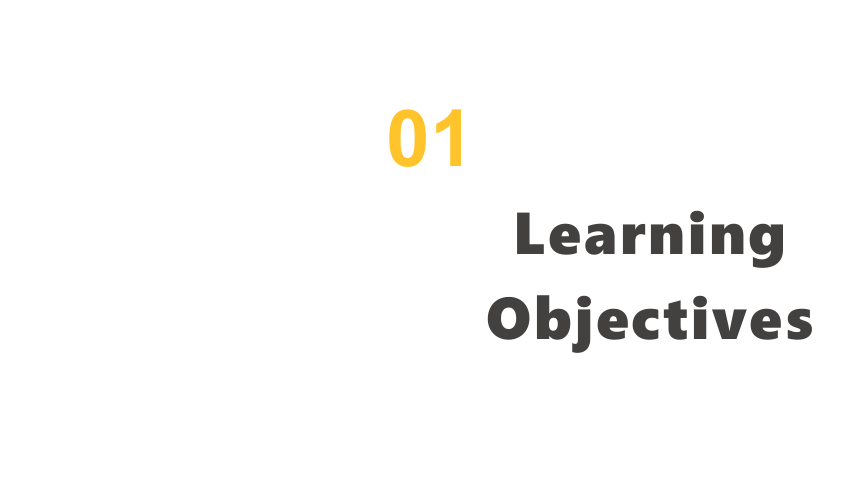

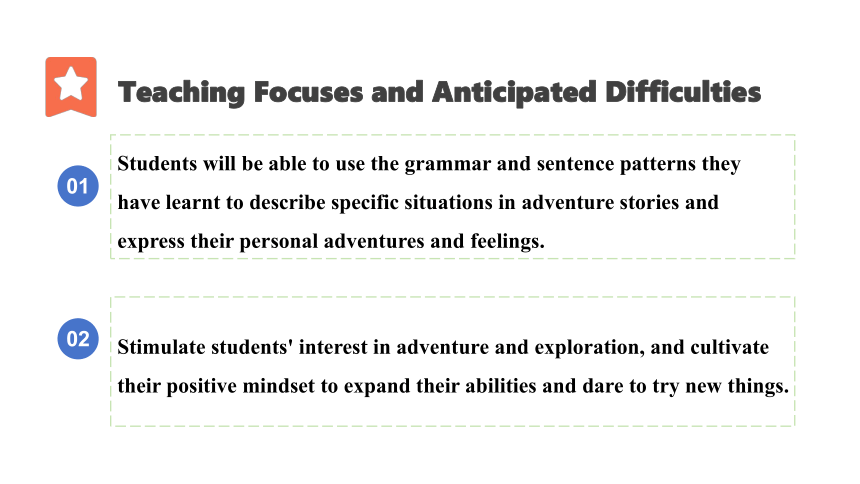
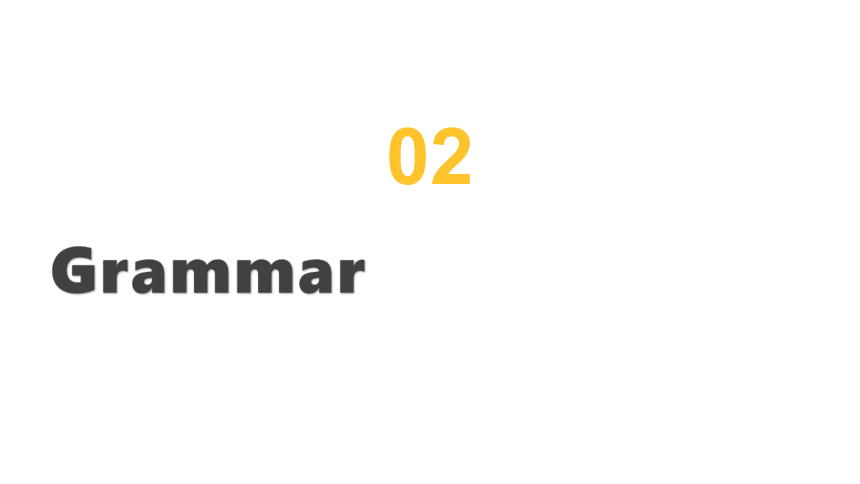
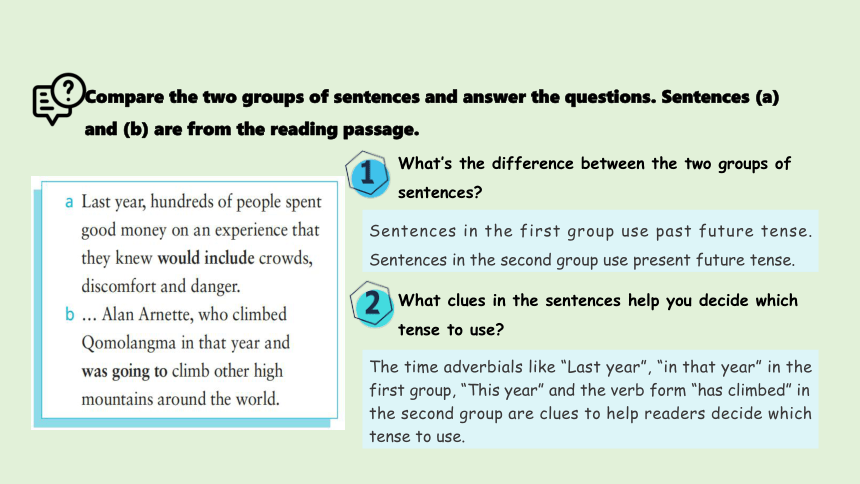
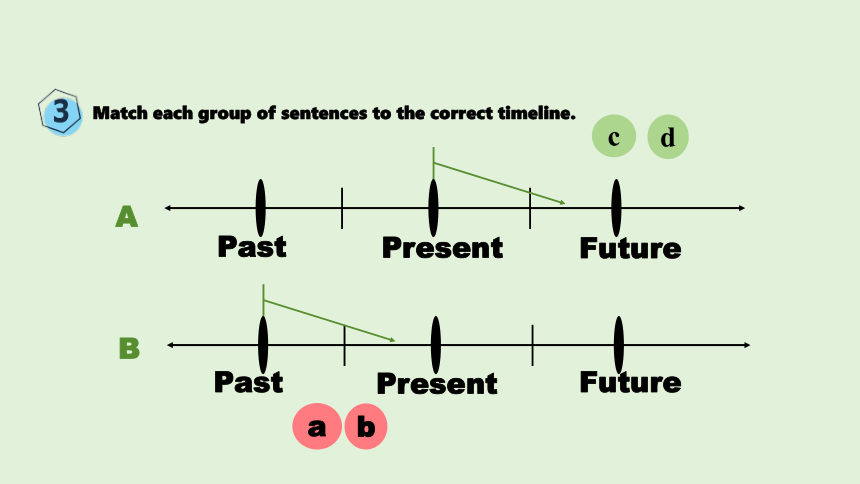
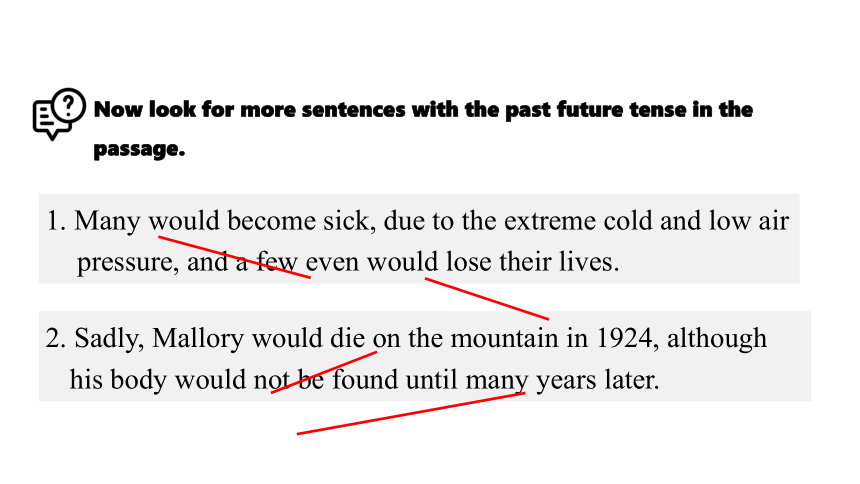
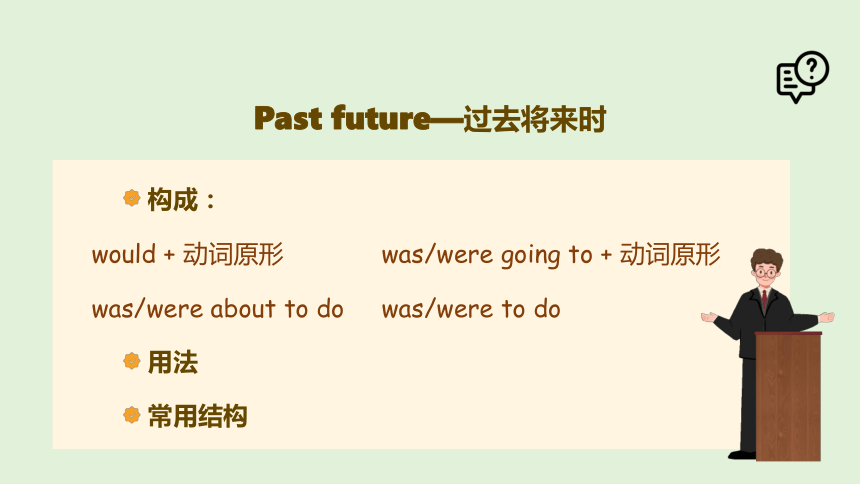
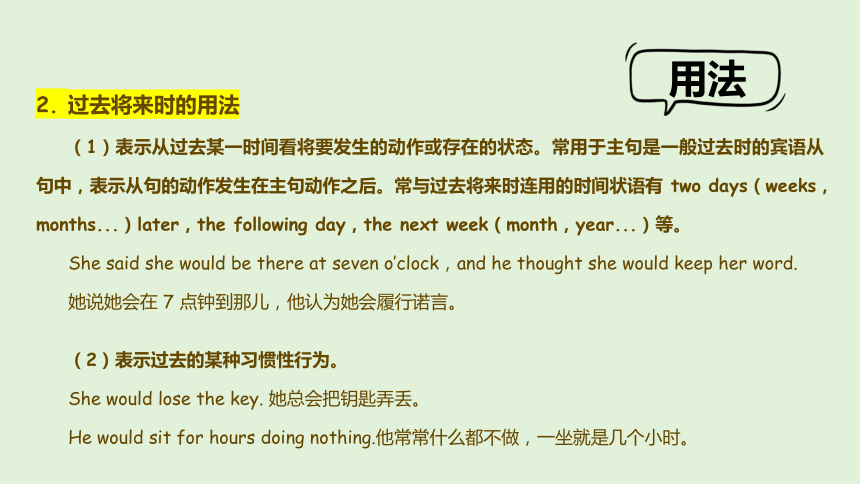
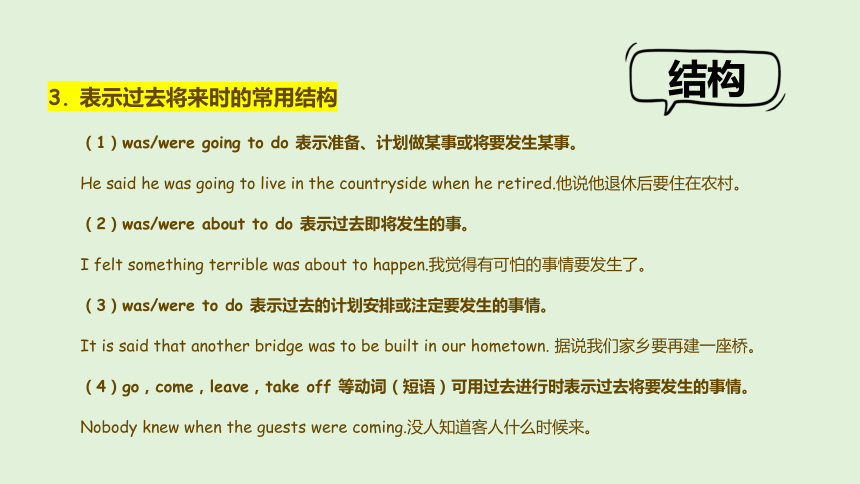

文档简介
(共42张PPT)
Unit 5
What an adventure!
Learning Objectives
01
Learning Objectives
01
Grasp the key words and the phrases and understand the various forms of the future tense.
03
Through listening, reading and searching for information, you will be able to acquire knowledge of first aid, feel the spirit of adventure and explore the meaning behind the spirit of adventure.
02
Correctly use the knowledge of grammar to complete the output of language, and can use past future tense in concrete language environment.
Students will be able to use the grammar and sentence patterns they have learnt to describe specific situations in adventure stories and express their personal adventures and feelings.
Stimulate students' interest in adventure and exploration, and cultivate their positive mindset to expand their abilities and dare to try new things.
01
02
Teaching Focuses and Anticipated Difficulties
Grammar
02
Compare the two groups of sentences and answer the questions. Sentences (a) and (b) are from the reading passage.
What’s the difference between the two groups of sentences
"I"
Sentences in the first group use past future tense. Sentences in the second group use present future tense.
What clues in the sentences help you decide which tense to use
The time adverbials like “Last year”, “in that year” in the first group, “This year” and the verb form “has climbed” in the second group are clues to help readers decide which tense to use.
Match each group of sentences to the correct timeline.
A
Past
Present
Future
B
Present
Future
Past
c
d
a
b
Now look for more sentences with the past future tense in the passage.
1. Many would become sick, due to the extreme cold and low air pressure, and a few even would lose their lives.
2. Sadly, Mallory would die on the mountain in 1924, although his body would not be found until many years later.
Past future—过去将来时
构成:
would + 动词原形 was/were going to + 动词原形
was/were about to do was/were to do
用法
常用结构
2. 过去将来时的用法
(1)表示从过去某一时间看将要发生的动作或存在的状态。常用于主句是一般过去时的宾语从句中,表示从句的动作发生在主句动作之后。常与过去将来时连用的时间状语有 two days(weeks,months...)later,the following day,the next week(month,year...)等。
She said she would be there at seven o’clock,and he thought she would keep her word.
她说她会在 7 点钟到那儿,他认为她会履行诺言。
(2)表示过去的某种习惯性行为。
She would lose the key. 她总会把钥匙弄丢。
He would sit for hours doing nothing.他常常什么都不做,一坐就是几个小时。
用法
3. 表示过去将来时的常用结构
(1)was/were going to do 表示准备、计划做某事或将要发生某事。
He said he was going to live in the countryside when he retired.他说他退休后要住在农村。
(2)was/were about to do 表示过去即将发生的事。
I felt something terrible was about to happen.我觉得有可怕的事情要发生了。
(3)was/were to do 表示过去的计划安排或注定要发生的事情。
It is said that another bridge was to be built in our hometown. 据说我们家乡要再建一座桥。
(4)go,come,leave,take off 等动词(短语)可用过去进行时表示过去将要发生的事情。
Nobody knew when the guests were coming.没人知道客人什么时候来。
结构
Exercise
(1) They made up their mind that they (buy)a new house once Larry changed jobs.
(2) She said that the train (leave)at six the next morning.
(3) At college, Barack Obama didn’t know that he was (become)the first black
president of the United States of America.
(4) James has just arrived,but I didn’t know he (come)until yesterday.
(5) I (come)to visit you later that day,but I had to phone and cancel.
was leaving
would buy
to become
was coming/would come
was coming/would come
be unaware of/that... 未意识到......
aware adj. 知道的,意识到的
awareness n. 认识,意识
be/become aware of/that... 意识到…… ,知道……
make sb. aware of/that... 使某人意识到……
as/so far as I am aware 据我所知
练习:The audience sat there calmly, ______________(aware)of the danger.
unaware
1. unaware
do oneself an injury 弄伤自己
injury to sb./sth. 对......的伤害
serious/minor injuries 重伤 / 轻伤
injured adj. 受伤的
be badly/seriously injured 严重受伤
get injured 受伤
练习:Luckily, the ____________(injure)were soon taken to the hospital.
injured
2. injury
Activity 2
Write the clauses in the correct order.
a. which / for three full days / the storm / would last
b. remain / where / we would / for many months to come
c. wouldn’t / for a very long time / be back / we
d. from port / we / sailing / were
the storm which would last for three full days
where we would remain for many months to come
we wouldn’t be back for a very long time
we were sailing from port
Activity 2
Now complete the captain’s memoir with the clauses.
the storm which would last for three full days
where we would remain for many months to come
It was spring, and ____. We were excited—none of us knew that these would be our final days together. At first, the sea was calm and we spent our days working, fishing and playing cards, happily unaware that ____. At that point, ____ was just a few dark clouds on the horizon. Hours later, the waves rose up over our ship, breaking it into two and throwing us overboard. Our only hope of survival was to swim to the nearest island, ____.
we wouldn’t be back for a very long time
we were sailing from port
a
b
c
d
Activity 3
Imagine you were one of the sailors. Answer the captain’s questions using I was going to…, but…
Did you hunt for food
Did you collect any water
I was going to hunt for food, but my knee was wounded.
I was going to collect some water, but I found there was a hole in the side of the bucket.
Activity 3
Imagine you were one of the sailors. Answer the captain’s questions using I was going to…, but…
Did you put up the tent
Did you build a fire
I was going to put up the tent, but I found I hadn’t got a hammer and nails.
I was going to build a fire, but suddenly it started to rain.
Activity 4
Look at the items in the first aid kit and talk about what they are used for.
Add anything else that you think would be useful.
first aid kit
bandage
plasters
painkillers
cotton wool balls
alcohol
ice pack
rubber gloves
scissors
thermometer
What should you do in the following situation
To reduce the pain, place a(n) _________
on the arm. If it is too cold, cover it with cloth (n. 布) beforehand (adv. 事先,预先). It is important to keep the arm still, so make a sling (n. 悬带,吊带) out of a(n) __________.
Activity 5
Describe the situations with the words you underlined in Activity 4.
FIRST AID GUIDELINES
Broken arm
ice pack
bandage
Put pressure on the cut with a clean cloth. Once the bleeding (n. 流血、失血) has stopped, clean the area out with fresh water or _____________________. Once the wound is cleaned and dry, cover it with a bandage.
Activity 5
Describe the situations with the words you underlined in Activity 4.
FIRST AID GUIDELINES
Cut
cotton wool balls
Take the person to a cool place and give him/ her lots of water to drink. Take the person’s temperature by putting a(n) ________________ under his /her tongue. If it is 40 ℃ or higher, take the person to hospital as soon as possible.
Activity 5
Describe the situations with the words you underlined in Activity 4.
FIRST AID GUIDELINES
Heatstroke
thermometer
Wash the area with liquid (n. 液体,液态物) medicine. If the bite becomes hot, red and itchy, try to cool it down. If the bite is painful, give the person one or two ______________. Go to hospital if necessary.
Activity 5
Describe the situations with the words you underlined in Activity 4.
FIRST AID GUIDELINES
Insect bite
painkillers
Activity 6
Work in pairs.
Offer first aid advice for injuries or illness in Activity 5. Add any more you can think of.
A: Are you OK What’s the matter
B: I think I’ve broken my arm. What should I do
A:
You should place an ice pack on the arm. To keep your arm still, you need to make a sling out of a bandage.
Amazing road trips
China’s National Highway 318
Activity 7
Listen to the interview and choose the words that best describe the speakers’ experiences.
2. Difficult and unpleasant
3. Challenging but rewarding
1. Expensive but fun
While listening and taking notes, you don’t need to write down every word in full. Using symbols and abbreviations can allow you to take notes more quickly. Next time you need to take notes, try using some of these: ∵/because, ∴/ therefore, 5/ five, ↑/ up, C20 / 20th century, 20 K / twenty thousand, diff./difference.
learning to learn
Activity 8
Listen again and complete the blog.
When we came back, we were asked a lot of questions about our adventure. Here we’ll try to answer the most frequently asked questions.
Why did you do it
We did it to _______________________________.
How did you prepare
We really practised a lot! If we weren’t studying, we were _______________.
raise money for a children’s charity
cycling
Activity 8
Listen again and complete the blog.
What difficulties did you encounter
We had to ____________________ day after day. We also had to face ______________ and dangerous falling rocks. _________ started from Chendu, but three friends got injured.
What did you see
The views were fantastic! The most impressive ones were those of ____________________.
cycling
How did you feel after the trip
It was the best feeling in the world! We had an adventure, raised some money and _______________________ to some children’s lives.
cycle up the mountains
snowy weather
Five of us
the snowy mountains
helped make a difference
Activity 9
Work in pairs. Act out the conversation to talk about the road trips across China.
Qingdao / Zhanqiao Pier / seafood
Hangzhou / West Lake and gardens / Dongpo Pork
Xiamen / Gulangyu Island / fish ball soup
student A
You and Student B have just come back from two different trips north-to-south across China. You took the following route, visited some scenic spots and tasted some local food:
Activity 9
student A
Ask Student B about his / her trip and complete the table. Then answer his / her questions about your trip
Cities he/she went to Places of interest he/she visited Food he/she tasted
Activity 9
student B
You and Student A have just come back from two different trips north-to-south across China. You took the following route, visited some scenic spots and tasted
some local food:
Jiaozuo / Yuntaishan Geopark / youcha
Changsha / Yuelu Mountain / preserved meat
Guilin / Lijiang River / rice noodles
Activity 9
student B
Answer Student A’s questions about your trip. Then ask Student A about his / her trip and complete the table.
Cities he / she went to Places of interest he/she visited Food he/she tasted
A. Although regarded as the most dangerous road in the country, it is also known as the "heavenly road" for its amazing views.
状语从句的省略
B. While listening and taking notes, you don’t need to write down every word in full.
A. 让步状语从句的省略结构, 从句中省略了主语i和be动词;
B. 时间状语从句的省略结构, 从句中省略了主语 you 和 be 动词。
状语从句的省略
(1) 在时间状语从句、让步状语从句、条件状语从句、方式状语从句中,如果从句主语和主句的主语一致,同时从句谓语含有be动词,可省去该从句的主语和be动词这时从句中可以出现如下结构:
① 连词+名词/形容词/介词短语
② 连词+现在分词/过去分词/不定式
When/While (I was) on my way to work,I met her.
在上班的路上,我遇见了她。
状语从句的省略
(2) 当从句的主语与主句的主语不一致,但从句的主语是it,从句中又含有 be动词, 可以把it 和 be 动词一起省略。
If(itis)necessary, I’ll come tomorrow.
如果有必要的话,明天我就来。
状语从句的省略的考查:判断连词后面用哪种非谓语形式,做这类题的关键是要弄清楚省略结构中的动词与其逻辑主语之间的关系,如果是主谓关系用现在分词,如果是动宾关系用过去分词。
Summary
03
教学实施方案
Homework
04
Homework
1. Work in pairs. Think about a trip you have taken and have a similar conversation;
2. summarise what we have learnt in this lesson;
3. prepare for the next lesson
See you
next class!
Unit 5
What an adventure!
Learning Objectives
01
Learning Objectives
01
Grasp the key words and the phrases and understand the various forms of the future tense.
03
Through listening, reading and searching for information, you will be able to acquire knowledge of first aid, feel the spirit of adventure and explore the meaning behind the spirit of adventure.
02
Correctly use the knowledge of grammar to complete the output of language, and can use past future tense in concrete language environment.
Students will be able to use the grammar and sentence patterns they have learnt to describe specific situations in adventure stories and express their personal adventures and feelings.
Stimulate students' interest in adventure and exploration, and cultivate their positive mindset to expand their abilities and dare to try new things.
01
02
Teaching Focuses and Anticipated Difficulties
Grammar
02
Compare the two groups of sentences and answer the questions. Sentences (a) and (b) are from the reading passage.
What’s the difference between the two groups of sentences
"I"
Sentences in the first group use past future tense. Sentences in the second group use present future tense.
What clues in the sentences help you decide which tense to use
The time adverbials like “Last year”, “in that year” in the first group, “This year” and the verb form “has climbed” in the second group are clues to help readers decide which tense to use.
Match each group of sentences to the correct timeline.
A
Past
Present
Future
B
Present
Future
Past
c
d
a
b
Now look for more sentences with the past future tense in the passage.
1. Many would become sick, due to the extreme cold and low air pressure, and a few even would lose their lives.
2. Sadly, Mallory would die on the mountain in 1924, although his body would not be found until many years later.
Past future—过去将来时
构成:
would + 动词原形 was/were going to + 动词原形
was/were about to do was/were to do
用法
常用结构
2. 过去将来时的用法
(1)表示从过去某一时间看将要发生的动作或存在的状态。常用于主句是一般过去时的宾语从句中,表示从句的动作发生在主句动作之后。常与过去将来时连用的时间状语有 two days(weeks,months...)later,the following day,the next week(month,year...)等。
She said she would be there at seven o’clock,and he thought she would keep her word.
她说她会在 7 点钟到那儿,他认为她会履行诺言。
(2)表示过去的某种习惯性行为。
She would lose the key. 她总会把钥匙弄丢。
He would sit for hours doing nothing.他常常什么都不做,一坐就是几个小时。
用法
3. 表示过去将来时的常用结构
(1)was/were going to do 表示准备、计划做某事或将要发生某事。
He said he was going to live in the countryside when he retired.他说他退休后要住在农村。
(2)was/were about to do 表示过去即将发生的事。
I felt something terrible was about to happen.我觉得有可怕的事情要发生了。
(3)was/were to do 表示过去的计划安排或注定要发生的事情。
It is said that another bridge was to be built in our hometown. 据说我们家乡要再建一座桥。
(4)go,come,leave,take off 等动词(短语)可用过去进行时表示过去将要发生的事情。
Nobody knew when the guests were coming.没人知道客人什么时候来。
结构
Exercise
(1) They made up their mind that they (buy)a new house once Larry changed jobs.
(2) She said that the train (leave)at six the next morning.
(3) At college, Barack Obama didn’t know that he was (become)the first black
president of the United States of America.
(4) James has just arrived,but I didn’t know he (come)until yesterday.
(5) I (come)to visit you later that day,but I had to phone and cancel.
was leaving
would buy
to become
was coming/would come
was coming/would come
be unaware of/that... 未意识到......
aware adj. 知道的,意识到的
awareness n. 认识,意识
be/become aware of/that... 意识到…… ,知道……
make sb. aware of/that... 使某人意识到……
as/so far as I am aware 据我所知
练习:The audience sat there calmly, ______________(aware)of the danger.
unaware
1. unaware
do oneself an injury 弄伤自己
injury to sb./sth. 对......的伤害
serious/minor injuries 重伤 / 轻伤
injured adj. 受伤的
be badly/seriously injured 严重受伤
get injured 受伤
练习:Luckily, the ____________(injure)were soon taken to the hospital.
injured
2. injury
Activity 2
Write the clauses in the correct order.
a. which / for three full days / the storm / would last
b. remain / where / we would / for many months to come
c. wouldn’t / for a very long time / be back / we
d. from port / we / sailing / were
the storm which would last for three full days
where we would remain for many months to come
we wouldn’t be back for a very long time
we were sailing from port
Activity 2
Now complete the captain’s memoir with the clauses.
the storm which would last for three full days
where we would remain for many months to come
It was spring, and ____. We were excited—none of us knew that these would be our final days together. At first, the sea was calm and we spent our days working, fishing and playing cards, happily unaware that ____. At that point, ____ was just a few dark clouds on the horizon. Hours later, the waves rose up over our ship, breaking it into two and throwing us overboard. Our only hope of survival was to swim to the nearest island, ____.
we wouldn’t be back for a very long time
we were sailing from port
a
b
c
d
Activity 3
Imagine you were one of the sailors. Answer the captain’s questions using I was going to…, but…
Did you hunt for food
Did you collect any water
I was going to hunt for food, but my knee was wounded.
I was going to collect some water, but I found there was a hole in the side of the bucket.
Activity 3
Imagine you were one of the sailors. Answer the captain’s questions using I was going to…, but…
Did you put up the tent
Did you build a fire
I was going to put up the tent, but I found I hadn’t got a hammer and nails.
I was going to build a fire, but suddenly it started to rain.
Activity 4
Look at the items in the first aid kit and talk about what they are used for.
Add anything else that you think would be useful.
first aid kit
bandage
plasters
painkillers
cotton wool balls
alcohol
ice pack
rubber gloves
scissors
thermometer
What should you do in the following situation
To reduce the pain, place a(n) _________
on the arm. If it is too cold, cover it with cloth (n. 布) beforehand (adv. 事先,预先). It is important to keep the arm still, so make a sling (n. 悬带,吊带) out of a(n) __________.
Activity 5
Describe the situations with the words you underlined in Activity 4.
FIRST AID GUIDELINES
Broken arm
ice pack
bandage
Put pressure on the cut with a clean cloth. Once the bleeding (n. 流血、失血) has stopped, clean the area out with fresh water or _____________________. Once the wound is cleaned and dry, cover it with a bandage.
Activity 5
Describe the situations with the words you underlined in Activity 4.
FIRST AID GUIDELINES
Cut
cotton wool balls
Take the person to a cool place and give him/ her lots of water to drink. Take the person’s temperature by putting a(n) ________________ under his /her tongue. If it is 40 ℃ or higher, take the person to hospital as soon as possible.
Activity 5
Describe the situations with the words you underlined in Activity 4.
FIRST AID GUIDELINES
Heatstroke
thermometer
Wash the area with liquid (n. 液体,液态物) medicine. If the bite becomes hot, red and itchy, try to cool it down. If the bite is painful, give the person one or two ______________. Go to hospital if necessary.
Activity 5
Describe the situations with the words you underlined in Activity 4.
FIRST AID GUIDELINES
Insect bite
painkillers
Activity 6
Work in pairs.
Offer first aid advice for injuries or illness in Activity 5. Add any more you can think of.
A: Are you OK What’s the matter
B: I think I’ve broken my arm. What should I do
A:
You should place an ice pack on the arm. To keep your arm still, you need to make a sling out of a bandage.
Amazing road trips
China’s National Highway 318
Activity 7
Listen to the interview and choose the words that best describe the speakers’ experiences.
2. Difficult and unpleasant
3. Challenging but rewarding
1. Expensive but fun
While listening and taking notes, you don’t need to write down every word in full. Using symbols and abbreviations can allow you to take notes more quickly. Next time you need to take notes, try using some of these: ∵/because, ∴/ therefore, 5/ five, ↑/ up, C20 / 20th century, 20 K / twenty thousand, diff./difference.
learning to learn
Activity 8
Listen again and complete the blog.
When we came back, we were asked a lot of questions about our adventure. Here we’ll try to answer the most frequently asked questions.
Why did you do it
We did it to _______________________________.
How did you prepare
We really practised a lot! If we weren’t studying, we were _______________.
raise money for a children’s charity
cycling
Activity 8
Listen again and complete the blog.
What difficulties did you encounter
We had to ____________________ day after day. We also had to face ______________ and dangerous falling rocks. _________ started from Chendu, but three friends got injured.
What did you see
The views were fantastic! The most impressive ones were those of ____________________.
cycling
How did you feel after the trip
It was the best feeling in the world! We had an adventure, raised some money and _______________________ to some children’s lives.
cycle up the mountains
snowy weather
Five of us
the snowy mountains
helped make a difference
Activity 9
Work in pairs. Act out the conversation to talk about the road trips across China.
Qingdao / Zhanqiao Pier / seafood
Hangzhou / West Lake and gardens / Dongpo Pork
Xiamen / Gulangyu Island / fish ball soup
student A
You and Student B have just come back from two different trips north-to-south across China. You took the following route, visited some scenic spots and tasted some local food:
Activity 9
student A
Ask Student B about his / her trip and complete the table. Then answer his / her questions about your trip
Cities he/she went to Places of interest he/she visited Food he/she tasted
Activity 9
student B
You and Student A have just come back from two different trips north-to-south across China. You took the following route, visited some scenic spots and tasted
some local food:
Jiaozuo / Yuntaishan Geopark / youcha
Changsha / Yuelu Mountain / preserved meat
Guilin / Lijiang River / rice noodles
Activity 9
student B
Answer Student A’s questions about your trip. Then ask Student A about his / her trip and complete the table.
Cities he / she went to Places of interest he/she visited Food he/she tasted
A. Although regarded as the most dangerous road in the country, it is also known as the "heavenly road" for its amazing views.
状语从句的省略
B. While listening and taking notes, you don’t need to write down every word in full.
A. 让步状语从句的省略结构, 从句中省略了主语i和be动词;
B. 时间状语从句的省略结构, 从句中省略了主语 you 和 be 动词。
状语从句的省略
(1) 在时间状语从句、让步状语从句、条件状语从句、方式状语从句中,如果从句主语和主句的主语一致,同时从句谓语含有be动词,可省去该从句的主语和be动词这时从句中可以出现如下结构:
① 连词+名词/形容词/介词短语
② 连词+现在分词/过去分词/不定式
When/While (I was) on my way to work,I met her.
在上班的路上,我遇见了她。
状语从句的省略
(2) 当从句的主语与主句的主语不一致,但从句的主语是it,从句中又含有 be动词, 可以把it 和 be 动词一起省略。
If(itis)necessary, I’ll come tomorrow.
如果有必要的话,明天我就来。
状语从句的省略的考查:判断连词后面用哪种非谓语形式,做这类题的关键是要弄清楚省略结构中的动词与其逻辑主语之间的关系,如果是主谓关系用现在分词,如果是动宾关系用过去分词。
Summary
03
教学实施方案
Homework
04
Homework
1. Work in pairs. Think about a trip you have taken and have a similar conversation;
2. summarise what we have learnt in this lesson;
3. prepare for the next lesson
See you
next class!
